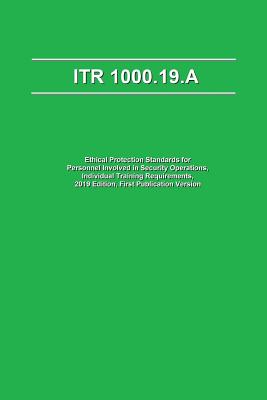

 Independently Published
Independently Published
Itr 1000.19.a: Ethical Protection Standards for Personnel Involved in Security Operations, Individual Training Requirements, 2019 Edition, First Publication Version


Key Metrics
- Matthew Smith
- Independently Published
- Paperback
- 9781799145592
- 9.02 X 5.98 X 0.09 inches
- 0.15 pounds
- Political Science > General
- English
 Secure Transaction
Secure TransactionBook Description
In the operations of the current security industry, attempts to maximize profits have replaced ethical priorities. Instead of seeking security personnel who exemplify high standards of performance, the industry leadership has sought the lowest standard of performance in order to undercut competitors with similarly low standards, creating a downward race toward a supposedly acceptable minimum. In the author's experience, the downward race has fallen significantly below an acceptable level, and the result is a web of unethical behavior from industry leadership which seeks to conceal performance failures.
In typical security operations, lip service is paid to vigilance, watchfulness, and observation, yet personnel are given little to no training in observation. Current industry leadership does not hold personnel accountable to best practices in observation, and allows persons to continue in positions of responsibility even after proven inability to meet acceptable levels of performance in observation. In a security operation which is led in an ethical manner, the performance standard for observation will be spelled out in a detailed and objective manner. The acceptable standard will be implemented in all training and in regular performance reviews.The failure of the current security industry extends beyond observation. It includes refusal to define standards of performance for other critical areas such as emergency tasks, verbal communication, use of force, and decision-making.
It is the mission of Sixth Training Group to present an ethical alternative to the failures of the current security industry. To that end, the author has prepared an array of standards which attempt to define a standardized level of performance which may be an acceptable minimum for all persons engaged in security operations.The standards have been given a numbering system which allows each standard to be individually identified. The six categories of observation, decision-making, use of force, verbal communication, emergency task performance, and personal performance is hoped to be both logical and useful.
In general, each standard presents a summary statement for a skill, task, or an area of understanding. It is recognized that there may be more than a single way to achieve these various states, but for most of them, the author is convinced that there is a benefit to requiring standardized skills, abilities, and knowledge. After the summary statement, each standard presents one or more knowledge areas which represent the minimum level of competent understanding. It is the author's conviction that it is in no way excessive to expect professionals to have a thorough understanding of about twenty pages of material. Finally, each standard will spell out the abilities which must be demonstrated in a standardized simulation or field exercise. If an individual cannot achieve these target levels of performance under controlled conditions, it is virtually certain that they will fail in the course of actual operations.
Author Bio
I joined the University of Strathclyde and the Centre for the Social History of Health and Healthcare (CSHHH) in 2011, after completing a PhD and post-doctoral work at the University of Exeter's Centre for Medical History. My research and teaching have focussed on three primary areas within the history of health and medicine: mental health and psychiatry; allergy and immunology; and food and nutrition.
Thanks to generous funding from the Wellcome Trust, this research has contributed to one edited volume: Proteins, Pathologies and Politics: Dietary Innovation and Disease from the Nineteenth Century (Bloomsbury, 2018, co-edited by David Gentilcore); and three monographs: An Alternative History of Hyperactivity: Food Additives and the Feingold Diet (Rutgers University Press, 2011); Hyperactive: The Controversial History of ADHD (Reaktion, 2012); and Another Person's Poison: A History of Food Allergy (Columbia University Press, 2015), which was reviewed in the New York Times and given honourable mention in the Association of American Publishers' Prose Awards for 2016.
I am currently working on a monograph project on the history of social psychiatry in the United States. Funded by an AHRC Early Career Fellowship, this project investigates how American psychiatrists and social scientists viewed the connection between mental illness and social deprivation during the decades that followed the Second World War. This funding has resulted in a special issue of Palgrave Communications (co-edited with Lucas Richert) and two edited volumes, Deinstitutionalisation and After: Post-War Psychiatry in the Western World (2016) and Preventing Mental Illness: Past, Present and Future (2018), both co-edited by Despo Kritsotaki and Vicky Long, and published in the Palgrave series I co-edit with Catharine Coleborne: Mental Health in Historical Perspective.
My social psychiatry project has spurred an interest in Universal Basic Income (UBI) as a preventive mental health policy. I am currently co-leading (with Mike Danton) a Scottish Universities Insight Initiative project called Peace of Mind: Exploring Universal Basic Income's Potential to Improve Mental Health.
In future, I would like to research the history of hydrotherapy in psychiatric practice.
I believe strongly that historical research can have a significant impact on public policy and decision making. As such, I have tried to engage with the public as much as I can through broadcasting, public lecturing, blogging and speaking to health and education professionals. My efforts in these areas were enhanced in 2012 when I was named an AHRC/BBC New Generation Thinker. I have written for medical publications, such as The Lancet and the Canadian Medical Association Journal (CMAJ), presented my research to the New York City Department of Health and Mental Hygiene and work closely with a range of medical and educational professionals. Recently, my book Hyperactive was used by novelist William Sutcliffe as inspiration and research for his novel Concentr8 (Bloomsbury, 2015).
I previously served as Vice-Dean of Research for the Faculty of Humanities and Social Sciences (HaSS), following stints as Co-Director of the Centre for the Social History of Health and Healthcare, the Director of Research for History and Deputy Head of the School of Humanities. I have also served on the Executive Committee of the Society for the Social History of Medicine and the Royal Society of Edinburgh's Young Academy of Scotland. I am a Fellow of the RSA and the Royal Historical Society.
Source: The University of Strathclyde
Videos


Community reviews
Write a ReviewNo Community reviews